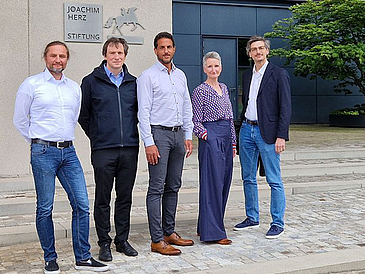Press release University of Bremen, 20.06.2024, Text: Sarah Batelka
The three pilot projects at the University of Bremen will pave the way for a resource-saving future. The first of these projects aims to accelerate the production of zinc-ion batteries, which play a decisive role in the expansion of solar and wind energy. The batteries are a safer, cheaper, and more environmentally friendly alternative to lithium-ion batteries, as they are based on readily available raw materials in an aqueous solution.
The second project aims to produce proteins for sustainable feed in aquaculture. They are essential in order to replace fishmeal and thus reduce overfishing. No fossil raw materials are needed, as the single-cell proteins are produced by microbial electrosynthesis using electricity, carbon dioxide, and wastewater.
The third project focuses on developing new types of sensors. These ensure the safe storage and reliable transportation of hydrogen, which is a key factor for climate-friendly mobility and the energy revolution. Based on organic semiconductors, the highly sensitive sensors allow for a particularly fast detection of leaks and micro fissures.
Eighteen applications were submitted from eleven Federal States. With the “MaTeNa innovate! Center” at the University of Bremen, the Joachim Herz Foundation aims to establish pioneering knowledge and technology transfer structures and close the systemic gap in innovation chains. MaTeNa stands for Materials – Technologies – Sustainability (German “Nachhaltigkeit”). The successful application was submitted by MAPEX – Center for Materials and Processes, which bundles activities in the Materials Science and Technologies high-profile area at the University of Bremen.
Flagship Project for the Transfer of Innovative Research Findings
Kathrin Moosdorf, Senator for Environment, Climate, and Science, said: "The University of Bremen conducts research for the benefit of society. Scientists here are already finding practical solutions - often in collaboration with companies - for the key challenges of our time and our everyday lives. This is knowledge transfer at its best. The funding awarded by the Joachim Herz Foundation is a great endorsement of this work over the past few years. The new 'MaTeNa innovate! Center' encourages us and the university to continue on this path and allows for even more innovation in Bremen."
Professor Michal Kucera, Vice President for Research and Transfer at the University of Bremen: “The MaTeNa innovate! Center bundles the innovative power of the outstanding materials research at the University of Bremen and our partner institutions in their search for new materials and production processes for the sustainable development of our society. This will enable us to transfer innovative research findings into new solutions for mobility, energy storage, and the circular economy much faster. As a flagship project for Northern Germany, MaTeNa underscores the vision of the Joachim Herz Foundation and the guiding principle of the University of Bremen: We want to assume social responsibility and actively shape a sustainable future through accelerated knowledge and technology transfer.”
“Innovative materials and their processes play a key role in the search for sustainable solutions to technological challenges,” states Professor Kurosch Rezwan, head of the MaTeNa innovate! Center and spokesperson of the MAPEX – Center for Materials and Processes at the University of Bremen. “I am therefore extremely delighted about this significant success: The MaTeNa innovate! Center enables a faster transition of the outstanding basic research of MAPEX into application through tailor-made transfer projects.”
“This is the biggest success for MAPEX to date,” comments Dr. Hanna Lührs, MAPEX Science Manager, “The innovation challenges are truly unique, as they allow us to take up current issues from industry and work together on innovative solutions.”
Professor Sabine Kunst, chair of the Joachim Herz Foundation: “We want to offer outstanding researchers an ideal environment where they can put their research findings to practical use for society and the economy. The University of Bremen impressed our jury with research projects that address present-day problems. Moreover, their proposal provided a convincing blueprint for how a systemic transfer to the economy can be created that benefits us all. I am convinced that together we will be able to attract attention beyond Bremen with the MaTeNa innovate! Center.”
As of 2026, in addition to the three pilot projects, the MaTeNa innovate! Center wants to support further pioneering projects from MAPEX and thus consolidate its role as a driving force for innovation. Scarcity of resources in materials and energy is also at the heart of the “The Martian Mindset: A Scarcity-Driven Engineering Paradigm” Cluster of Excellence proposal initiated by MAPEX. It was invited by the German Research Foundation to submit a full proposal and offers additional potential for technology transfer projects at the MaTeNa innovate! Center.
Further Information
Press release Joachim Herz Foundation (in German)
Contact
Dr. Hanna Lührs and Professor Kurosch Rezwan
MAPEX Center for Materials and Processes
University of Bremen
Phone: +49 421 218-64580
Email: mapex@uni-bremen.de

